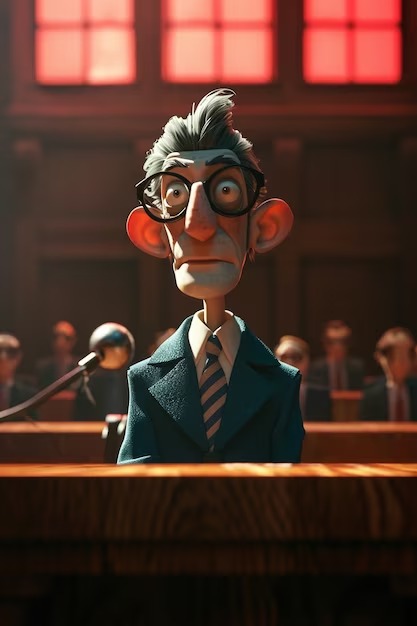
Justice Clarence Thomas Supreme Court and the Federalist Society Under Scrutiny for Alleged Bribery
Justice Clarence Thomas Supreme Court and the Federalist Society Under Scrutiny for Alleged Bribery
The integrity of the judiciary is paramount for ensuring public trust in the legal system. Recent events have cast a shadow over this vital institution, raising questions about the interactions between judges and influential political entities. As scrutiny intensifies, various stakeholders are calling for transparency and accountability within the highest echelons of the judiciary.
Within this context, specific individuals have been thrust into the spotlight, with discussions revolving around potential improprieties that challenge the ethical framework of judicial conduct. The discourse delves into how affiliations with prominent advocacy groups may influence judicial decisions, prompting a closer examination of the interplay between ideology and jurisprudence.
The implications of these discussions are far-reaching, suggesting a need for reform and renewed focus on maintaining the sanctity of the legal system. As the debate unfolds, it highlights the importance of fostering an environment where judicial independence remains untainted by external pressures, ensuring justice is served fairly and without bias.
Background on Clarence Thomas’s Career
This section delves into the professional journey of a prominent figure in the judicial system, highlighting the key milestones that have shaped his influence and legacy. From his early beginnings to his ascent within the legal framework, the trajectory reflects a blend of personal experiences and pivotal moments in American law.
Early Life and Education
The individual in question was born in a modest environment, which instilled in him a strong work ethic and determination. Following his initial education, he pursued higher learning, culminating in a degree from a prestigious university. This foundation laid the groundwork for a remarkable career in law and governance.
Judicial Appointments and Influence
| Year | Position | Key Contributions |
|---|---|---|
| 1974 | Assistant Secretary | Focus on consumer affairs |
| 1981 | Chairman | Upholding regulations related to industry |
| 1991 | Supreme Court Justice | Influential in major rulings on constitutional matters |
Overview of Bribery Allegations
This section delves into the serious charges of corruption surrounding a prominent judicial figure. These claims suggest unethical interactions between this individual and various influential entities, raising questions about integrity and accountability within the judicial system. The implications of such accusations extend beyond personal conduct, touching upon systemic issues that may affect public trust.
Recent reports have outlined instances where gifts, luxury trips, and other benefits allegedly exchanged hands, prompting scrutiny from various quarters. Investigations aim to uncover the extent of these interactions and their potential impact on legal decisions. Critics argue that these dealings could compromise impartiality, emphasizing the need for transparency and reform in the oversight of judicial conduct.
In examining this controversy, it is crucial to consider the wider implications for governance and the judiciary. The potential erosion of public confidence in legal institutions could have far-reaching consequences, necessitating a thorough exploration of the ethical frameworks that underpin judicial behavior. Ultimately, the ongoing discourse around these claims invites a broader examination of morality and power within the landscape of American jurisprudence.
The Federalist Society’s Influence on Judiciary
The organization has emerged as a pivotal force within the American legal establishment, shaping various aspects of judicial appointments and legal interpretations. Its extensive network promotes a specific worldview that emphasizes originalist and textualist approaches to constitutional analysis. This influence extends to a broad range of legal practitioners, scholars, and judges, fostering a shared ideology that resonates throughout the judiciary.
The organization plays a significant role in cultivating relationships among legal professionals, enhancing the prominence of individuals aligned with its principles. By hosting events, seminars, and discussions, it creates opportunities for collaboration and knowledge exchange, which further solidifies its doctrinal impact. This network not only informs current legal debates but also actively seeks to place like-minded individuals in influential judicial positions.
The organization’s strategies reflect an understanding of the importance of the judiciary in shaping public policy. By advocating for appointments that align with its philosophical ideals, it has successfully positioned various judges who interpret laws through a lens consistent with its mission. This calculated maneuvering has profound implications for the evolution of legal precedents, impacting cases that resonate deeply within society.
Implications for Judicial Ethics Reform
The recent controversies surrounding high-ranking judicial figures have raised critical questions about the integrity of the judiciary and the need for substantial reform in ethical standards. Discussions emphasize the necessity for greater transparency, accountability, and adherence to principles that uphold public trust in the judicial system.
This scrutiny highlights a pathway for reform, pushing for legislative measures that would establish clearer guidelines governing conduct and relationships between judges and external entities. The focus is shifting towards creating a more robust framework that minimizes potential conflicts of interest and strengthens ethical compliance.
Moreover, engagement from various stakeholders, including legal experts, advocacy groups, and policymakers, is essential for fostering a culture of ethical responsibility. By advocating for a comprehensive review of existing protocols, there is an opportunity to enhance the reputation of the legal system and ensure that it operates free from undue influence.
As a result, reform initiatives might include mandatory reporting requirements for gifts and affiliations, rigorous training on ethical standards, and the establishment of independent oversight bodies. These actions could significantly contribute to restoring faith in judicial impartiality and reinforcing the core values that govern the legal profession.
Public Response and Political Reactions
The recent controversy surrounding a prominent figure has ignited a wave of public discourse and political responses. Citizens, advocacy groups, and lawmakers are weighing in, leading to a multifaceted discussion about ethics, accountability, and the integrity of judicial appointments. This moment serves as a litmus test for both public sentiment and the political landscape.
Grassroots movements have emerged, calling for transparency and reforms within the judiciary. Activists have leveraged social media platforms to amplify their voices, creating hashtags and campaigns that demand accountability. On the other hand, supporters of the individual in question argue that these claims are politically motivated, dismissing them as unfounded attacks aimed at undermining the credibility of the judicial system.
In legislative circles, reactions have varied widely. Some lawmakers have proposed immediate investigations, emphasizing the need for thorough scrutiny to maintain public trust. Meanwhile, others defend the status quo, arguing that the current system is adequate and does not require additional oversight. This divergence in opinion reflects broader ideological divides, as discussions about ethics in leadership continue to polarize political factions.
Media coverage has played a significant role in shaping public perception, with outlets providing differing viewpoints that influence how citizens interpret the unfolding events. Editorials and analyses have sparked conversations in various demographics, further complicating the narrative and encouraging a deeper exploration of the implications for governance.
As this situation develops, the ongoing dialogue about ethics, power dynamics, and judicial integrity highlights not only the immediate concerns but also raises questions about the future of public trust in institutions. The landscape will continue to evolve as reactions unfold, ensuring that this issue remains at the forefront of national discourse.
Future of Thomas’s Supreme Court Tenure
The future of a prominent member of the highest judicial body in the United States is a subject of significant debate. As public scrutiny intensifies around various matters, the implications for his ongoing presence on the bench are becoming increasingly pertinent.
This individual has long been a pivotal figure, influencing many landmark decisions. However, recent developments raise questions about the sustainability of his tenure. Key factors to consider include:
- Public perception and trust in judicial integrity
- Potential impacts on ongoing cases and legal precedents
- Responses from political entities and advocacy groups
- The influence of media narratives on public opinion
Each of these elements plays a critical role in shaping the landscape of judicial leadership and accountability. Observers remain keenly interested in how these dynamics will unfold and what consequences they might hold for the court’s future direction.
Discussions surrounding judicial conduct often highlight the need for transparency and ethical standards. Moving forward, maintaining credibility while navigating external pressures may prove essential for this justiciary figure.
- Monitoring legislative responses to judicial conduct
- Assessing the impact of public opinion on judicial appointments
- Examining changes in internal court dynamics and decision-making processes
The convergence of these factors will determine not only the individual’s future but also the broader implications for the judicial system as a whole. Therefore, understanding these developments is crucial for both legal scholars and the general populace.
Q&A: Clarence thomas bribery fedsoc
What are the recent allegations surrounding Justice Thomas and his relationship with billionaire Harlan Crow?
Recent allegations suggest that Justice Thomas has received undisclosed gifts and benefits from billionaire Harlan Crow, raising concerns about potential conflicts of interest in his role as a Supreme Court Justice.
How has ProPublica reported on the financial dealings involving Ginni Thomas and Leonard Leo?
ProPublica has reported that Ginni Thomas, the wife of Supreme Court Justice Clarence Thomas, has connections to Leonard Leo, a prominent right-wing donor, highlighting the need for greater disclosure regarding their financial interactions.
What impact do the undisclosed gifts from Harlan Crow have on Justice Thomas’s credibility?
The undisclosed gifts from Harlan Crow may undermine Justice Thomas’s credibility, as they raise questions about his impartiality and whether he should recuse himself from cases involving wealthy donors.
How does the involvement of Chief Justice John Roberts influence discussions about ethics on the Supreme Court?
Chief Justice John Roberts plays a significant role in discussions about ethics on the Supreme Court, especially in light of controversies involving justices like Clarence Thomas and their relationships with Republican donors.
What are the implications of Justice Thomas’s failure to disclose travel on a private jet owned by Harlan Crow?
Justice Thomas’s failure to disclose travel on Harlan Crow’s private jet could lead to calls for stricter ethics rules for justices, particularly regarding transparency in their financial dealings with influential donors.
How has the media responded to the revelations about Ginni Thomas’s political activities?
The media has scrutinized Ginni Thomas’s political activities, especially her connections with right-wing organizations and donors, which may reflect on her husband’s role as a Supreme Court Justice.
What role does Leonard Leo play in shaping the judicial landscape in relation to Justice Thomas?
Leonard Leo is a key figure in shaping the judicial landscape through his influence as a Republican donor and strategist, which raises concerns about potential biases affecting Justice Thomas’s decisions.
What are the arguments for and against Justice Thomas recusing himself from cases involving major donors?
Arguments for Justice Thomas recusing himself center on maintaining judicial integrity and avoiding conflicts of interest, while arguments against it often cite his experience and ability to remain impartial despite personal connections.
How does the relationship between Ginni Thomas and right-wing organizations affect public perception of the Supreme Court?
The relationship between Ginni Thomas and right-wing organizations can negatively affect public perception of the Supreme Court, as it may suggest that justices are influenced by partisan interests rather than upholding impartial justice.
What steps have been proposed to improve disclosure requirements for Supreme Court Justices?
Proposals to improve disclosure requirements for Supreme Court Justices include mandating more comprehensive reporting of gifts, travel, and financial relationships with donors to enhance transparency and accountability within the judiciary.
What are the implications of the undisclosed gifts received by Justice Clarence Thomas from billionaire Republican donor Harlan Crow?
The undisclosed gifts raise concerns about potential conflicts of interest and whether Justice Thomas could be influenced in cases involving business before the court.
How has the relationship between Thomas and the billionaire Harlan Crow affected perceptions of judicial ethics?
Thomas’s relationship with Crow, including luxury vacations and travel on private jets, has led to accusations that he has broken long-standing norms regarding financial disclosures required of justices.
What role do Chief Justice John Roberts and the current Supreme Court play in addressing ethics concerns related to Justice Thomas?
Chief Justice John Roberts has been under pressure to implement stricter ethical guidelines, as the current Supreme Court faces scrutiny over how it handles issues related to public corruption and financial disclosures.
How did Justice Thomas’s connections to Harlan Crow and Leonard Leo influence his decisions on the bench?
Critics argue that Thomas’s ties to Crow and Leo suggest a potential bias in his rulings, particularly in cases where these individuals have vested interests, which raises questions about his impartiality.
What was the significance of Thomas attending luxury vacations at Crow’s private resort in the Adirondacks?
Attending luxury vacations at Crow’s private resort highlights concerns about the influence of wealthy benefactors on justices, further complicating the perception of Justice Thomas’s integrity.
How has Justice Thomas responded to allegations of wrongdoing regarding his relationship with Harlan Crow?
Justice Thomas has defended himself by stating that he has never knowingly violated any laws or ethical standards, asserting that he is incorruptible despite the scrutiny he faces.
What are the historical precedents for Supreme Court justices receiving gifts from political donors?
Historically, justices like Justice Abe Fortas faced similar scrutiny for accepting gifts, leading to calls for clearer codes of conduct to prevent conflicts of interest within the high court.
How do ethics experts view the failure to disclose gifts received by Thomas from Crow?
Ethics experts argue that Thomas’s failure to disclose these gifts violates a law passed to ensure transparency among public officials, indicating a need for reform within judicial ethics.
What impact does the relationship between Ginni Thomas and Harlan Crow have on public trust in the Supreme Court?
The connection between Ginni Thomas and Harlan Crow, along with their political activities, raises concerns about whether Justice Thomas and his wife are trying to influence the court’s decisions.
In what ways have members of the Federalist Society responded to the allegations against Justice Thomas?
Members of the Federalist Society have expressed mixed reactions; while some defend Thomas, others have condemned his actions as detrimental to the reputation of the judiciary and its integrity.







